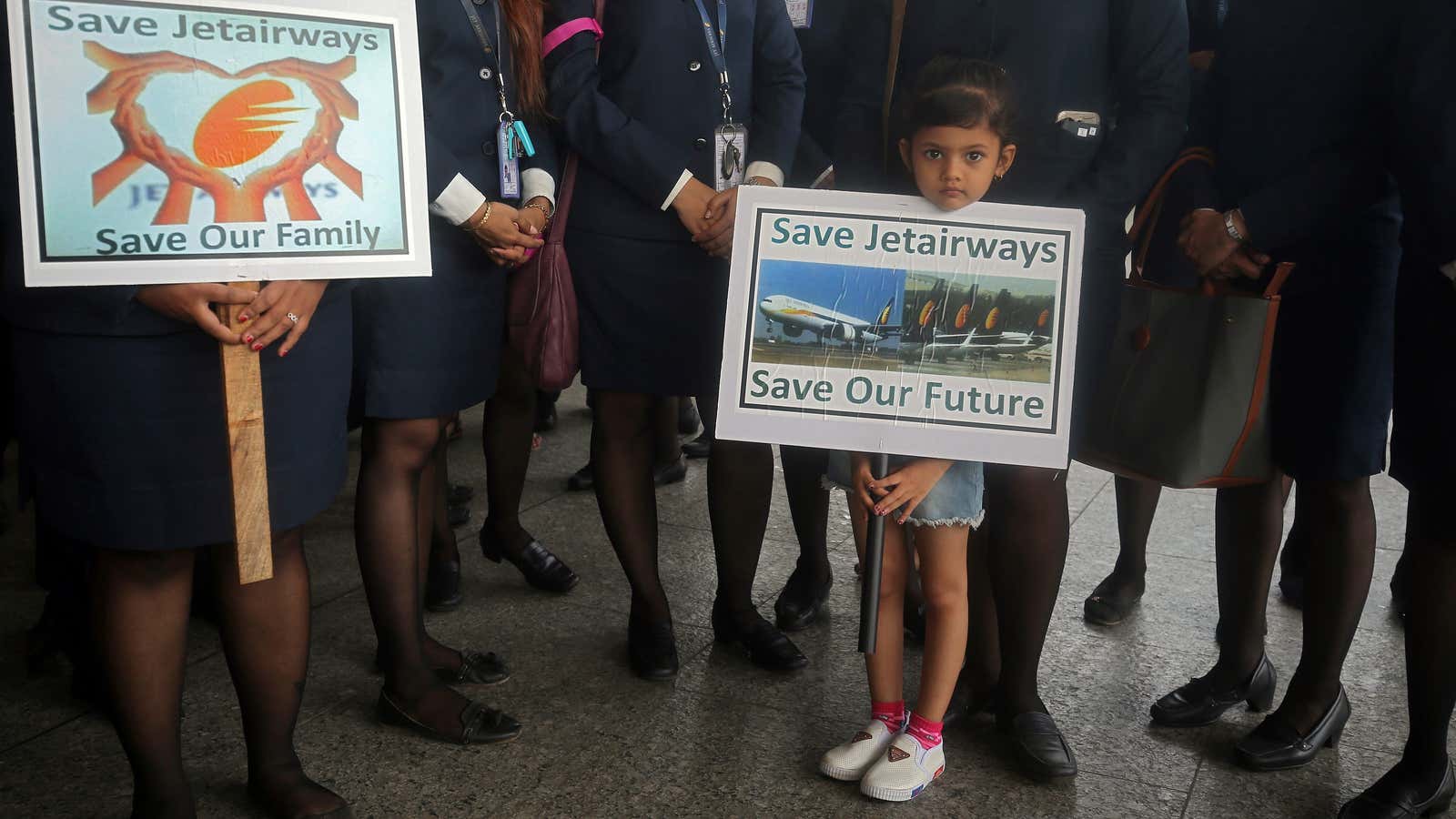Regular flyers and employees of India’s oldest private airline, Jet Airways, are now stepping in to rescue the temporarily grounded carrier.
A group of frequent flyers of Jet has approached the airline’s key lenders—including the State Bank of India (SBI) and ICICI Bank—with a buyout plan, the news agency IANS reported on May 05. The plan also involves the carrier’s staff, who have already expressed their willingness to buy out the lenders’ stake in Jet, similar to how United Airlines was taken over by its employees in the US in 1994.
The group of frequent flyers comprises members of JetPrivilege, the airline’s loyalty programme, which rewards customers with JPMiles, or points that can be redeemed while booking flights or hotels. The programme is managed by Jet Privilege Private Limited, an independent entity under the Abu Dhabi-based airline Etihad—a minority shareholder in Jet.
Called the Revival of Jet Airways Plan (ROJA), the group has proposed a two-stage leveraged buyout. In the first stage, the employees will become part-owners and take control of Jet, with the help of loans provided by the airline’s existing lenders.
“The banks can give a Rs1,500 crore ($216 million) loan to the employees. This is six months’ salary of each employee as personal loan. The employees will use this money to buy out 51% stake in the company from SBI and 12.5% from Etihad. This way the employees will control Jet Airways,” read the presentation, according to IANS.
In the second stage of the plan, the frequent flyers will infuse money indirectly.
Having taken control, the employees would pursue banks to give a personal loan to those who want to buy four tickets for Rs10,000 each, which would be valid for two years. By pre-selling these tickets, as much as Rs8,000 crore can be raised, according to the presentation.
The latest proposal comes even as lenders have invited bids from potential investors. The first round of bidding for Jet will conclude on May 10.
“We are working on every possible way to save the airline, and as a result, with the help of financial experts we have come up with a plan, however, there isn’t any positive response from the bidders till now. We are looking forward to May 10 and only after that it would be clear where the airline stands,” Nikunj Agarwal, a pilot with Jet Airways for eight years, told Quartz.
Confronted with unpaid salaries and facing an uncertain future, Jet’s employees had written to SBI chairman Rajnish Kumar, on April 29, to consider their bid for the airline, claiming they would be able to arrange at least Rs7,000 crore.
“The contribution of employee group over a hypothetical five-year Employee Stock Ownership Programme (ESOP) is likely to be upward of Rs4,000 crore. In addition, we are also confident of securing an investment commitment of up to Rs3,000 crore from outside investors,” the letter read. In an ESOP plan, employees are given stock ownership of a company by the management, after upfront payment.
“The employee-led turnaround is modelled on similar plans in the West like that of United Airlines,” the letter explained. However, the experience of United Airlines in the US shows that an employee-led buyout is not really a watertight plan.
Lessons from the past
The story of United Airlines has many parallels with that of the embattled Jet. In the mid-1990s, the US carrier was facing stiff competition from low-cost competitors.
A big goal of the buyout was to reduce costs by letting employees take management control. Shareholders of the UAL Corporation, United’s parent, approved the acquisition of a 55% stake by workers in the company in July 1994 under an ESOP plan. The move, however, was accompanied by drastic cuts in pay and other benefits of United’s employees.
The scheme worked well initially. But soon, matters took a turn for the worse.
A slumping economy and a costly bid to acquire US Airways in 2000 proved fatal to United’s financial health. In 2002, the airline, burdened with a $1-billion debt, filed for bankruptcy. With it, the airline’s ESOP era came to an end.
India’s Jet also risks going the United Airlines way, unless it can shed its past baggage. “Jet will only gain if the new buyer, even if employees take over, successfully overcomes the problem of legacy that the airline currently faces,” said Kinjal Shah, an analyst at the ratings agency ICRA.
But given their plight, the employees have their skin in the game, and it is natural for them to help Jet grow back its wings.
